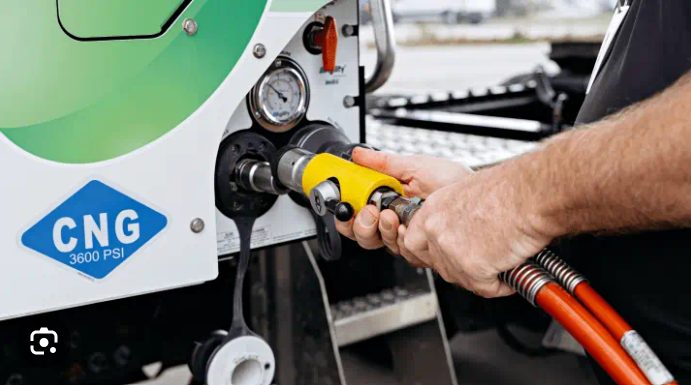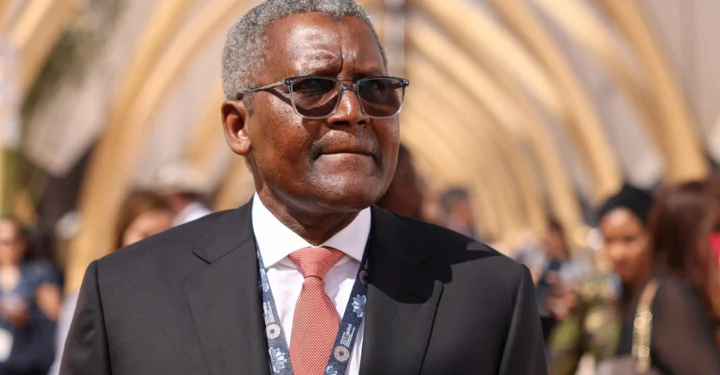The Case for CNG Over Fuel in Nigeria’s Transportation
Nigeria is facing a significant crossroads in energy as the government, backed by private sector investments, seeks transition from traditional fuel to Compressed Natural Gas (CNG) as a primary fuel source for transportation. Recent steps by President Bola Ahmed Tinubu, including initiatives to distribute one million CNG conversion kits for vehicles, signal a firm commitment to clean energy. Still, as the country pursues this alternative, there are questions about whether CNG can realistically replace fuel dependency across Nigeria.
Dangote Cement Plc has responded to the call with an investment of over $280 million in CNG technology. With this move, the company hopes to reduce its carbon footprint by operating a fleet largely powered by CNG by mid-2026. “Our goal is to lead the charge in the shift toward sustainable energy,” says Arvind Pathak, group managing director of Dangote Cement. “This transition is not just a response to policy but our commitment to a greener Nigeria.”
Join our WhatsApp ChannelThe Economic Stakes of the CNG Shift
Transitioning to CNG goes beyond environmental benefits; it’s also about economic stability. In a recent address, President Tinubu emphasised, “Utilising natural gas to power Nigeria’s transportation industry is the next way to go.” His message points to the economic potential that lies within Nigeria’s vast natural gas reserves, positioning it as a strategic alternative that could mitigate the impacts of rising fuel prices.
Experts are cautiously optimistic. Oluwabunmi Ayodeji, an economist, shared, “If Nigeria fully leverages its natural gas, it could reduce the economic pressure on citizens dependent on imported fuel. CNG could save both the government and private sectors millions.” However, Ayodeji notes that the country’s readiness for such a drastic shift is still under question, citing the high costs of it infrastructure as a potential barrier.
Nigerian Voices on CNG vs. Fuel
Opinions among Nigerians are mixed. In Gbagada, Lagos, Chike Ugochukwu, a commercial driver, expressed concern. “If CNG stations are not everywhere, how do we refill? Not everyone can wait for fuel stations to adapt.” Ugochukwu also worries about conversion costs, adding, “Who pays to convert all these old cars to CNG? Drivers like me can’t afford that.”
For many Nigerians, the question remains practical: will CNG stations be accessible? Current reports indicate that the government is rolling out CNG stations in major cities, but rural areas remain underserved. Pathak shared Dangote Cement’s response to these concerns, highlighting that the company’s CNG infrastructure, with its Obajana station capable of refuelling over 3,000 trucks, is designed to create greater availability. “Our CNG stations at Obajana and Ibese will ease refuelling for a growing fleet of vehicles,” Pathak explains.
Environmental Impact and CNG’s Green Potential
While many consider CNG to be the future of Nigeria’s transport industry, some environmental experts argue that CNG is a short-term solution rather than a permanent fix. Environmentalist Amina Bello stresses, “CNG is cleaner than traditional fuels, but it’s still a fossil fuel. For real change, Nigeria needs to think beyond CNG toward renewables.” Bello acknowledges that the transition to CNG can bridge the gap until renewable options become more viable, but she insists on the importance of an end goal that reduces fossil fuel dependency altogether.
Dangote Group’s President, Aliko Dangote, aligns with President Tinubu’s Nationally Determined Contribution (NDC) under the Paris Agreement, which sets a net-zero emissions target by 2060. He says, “In this pursuit of transition to clean energy, we are optimistic of a remarkable accomplishment by President Bola Ahmed Tinubu.” Dangote’s investment in CNG not only contributes to a cleaner Nigeria but also supports the country’s commitments to global environmental goals.
Will Nigeria’s Infrastructure Catch Up?
READ ALSO: The Role Of States And LG In The Adoption Of CNG In Nigeria
The infrastructure needed for a CNG transition poses a significant challenge. Retrofitting fuel stations and building new CNG stations will require both time and money. Dr. Nkemdi Okeke, an energy analyst, pointed out that “the speed at which the government can provide CNG infrastructure will be the ultimate test of its commitment to clean energy.” He further explained that without rapid infrastructure expansion, the adoption of it might remain limited to urban centers, leaving rural areas underserved and reliant on traditional fuel.
Pathak emphasizes that Dangote Cement is pushing to expedite infrastructure development. “We’re pursuing this timeline aggressively to meet deployment by the first quarter of 2025,” he said. Pathak added that the company is working closely with government bodies to ensure timely infrastructure deployment, suggesting that private sector partnerships could be instrumental in meeting national CNG targets.
Nigerians Weigh Costs and Benefits of CNG
The transition to CNG has sparked public debate on the costs and benefits for the average Nigerian. “I’m hopeful CNG will bring down fuel costs,” says Blessing Ibe, a small business owner. “But, the initial costs of conversion and access to CNG stations worry me. It’s not enough to introduce CNG; it has to be affordable and accessible.”
For the Nigerian government, affordability is indeed a top concern. President Tinubu has promised the distribution of free CNG conversion kits for commercial vehicles, a move aimed at easing costs for transport businesses. However, individuals will still bear the costs of personal vehicle conversion. The government’s long-term goal, as stated by Tinubu, is to create a “conducive environment for private sector investments” that would expand the infrastructure, potentially bringing down conversion costs over time.
The Road Ahead for Nigeria’s Energy Independence
Nigeria’s leap into CNG is a bold step toward energy independence, but its success depends on how quickly infrastructure can meet the needs of all Nigerians. While Dangote Cement’s investment is a strong private sector endorsement of this vision, questions remain about accessibility and affordability for the average citizen. Pathak and Dangote hope their fleet expansion will inspire other companies to invest similarly, catalyzing a national shift.
Ultimately, as the government and private sectors join forces to drive Nigeria’s CNG transition, the success of this movement rests on inclusive infrastructure. As Pathak optimistically concludes, “With the right support and commitment, Nigeria could set a model for clean energy in Africa.” Yet, only time will tell if it will truly wean Nigeria off fuel dependency or if this shift will become yet another stalled promise in the country’s energy journey.
As the Nigerian government pushes for cleaner energy, the shift could redefine transportation. Whether it will become a practical alternative for most Nigerians or remain a limited luxury depends on infrastructure, affordability, and Nigeria’s resolve to fuel the future responsibly.
Emmanuel Ochayi is a journalist. He is a graduate of the University of Lagos, School of first choice and the nations pride. Emmanuel is keen on exploring writing angles in different areas, including Business, climate change, politics, Education, and others.
- Emmanuel Ochayihttps://www.primebusiness.africa/author/ochayi/
- Emmanuel Ochayihttps://www.primebusiness.africa/author/ochayi/
- Emmanuel Ochayihttps://www.primebusiness.africa/author/ochayi/
- Emmanuel Ochayihttps://www.primebusiness.africa/author/ochayi/



















Follow Us